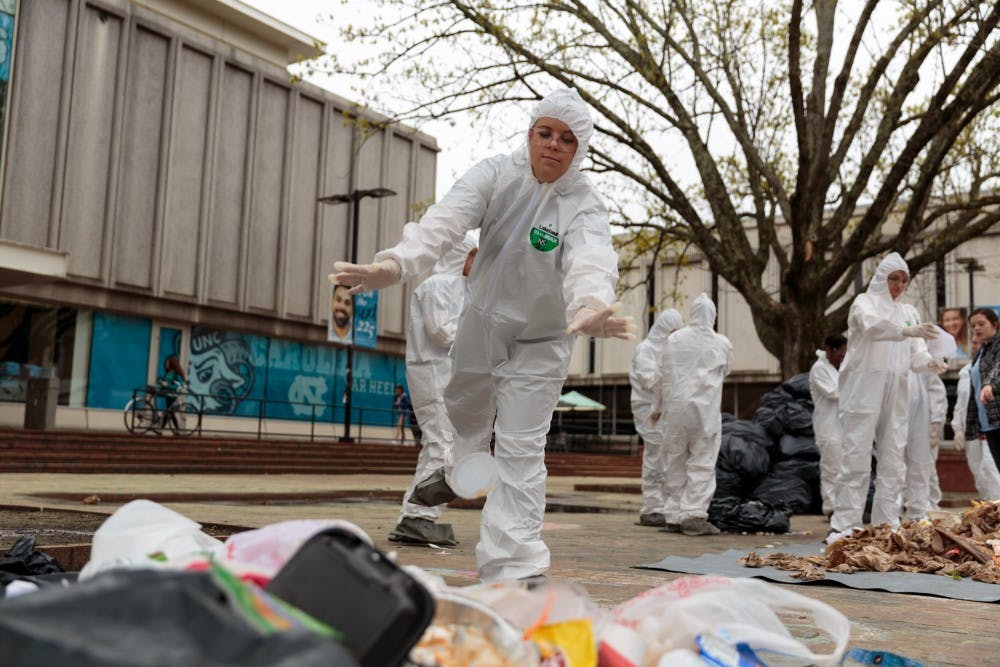Ives had run the initiative since its inception, and he received the North Carolina Sustainable Energy Association's 2018 Individual Energy Leader Award. Other contributions Ives made in his work at UNC include overseeing the Student Store’s transition to new management under Barnes and Noble College in 2016.
But after UNC terminated Ives last fall, his various responsibilities were divided among different administrators. The management of Energy Services went to Nathan Knuffman, deputy vice chancellor for finance and operations.
In an email, Chancellor Kevin Guskiewicz told Pruitt and executive vice chancellor and provost Bob Blouin on Aug. 22 that he'd received "several emails today about Brad's departure." He pointed to one email in particular he'd received from Richard Andrews, professor emeritus of environmental policy.
“It is a real loss to the campus that (Ives') tenure here ended so suddenly and in this way," Andrews wrote in his email to Guskiewicz.
"From what I can see on the internet, the administrators to whom Brad's responsibilities as chief sustainability officer have been handed off do not appear to have any obvious background or commitment to this mission. I earnestly hope that you will promptly appoint a new chief sustainability officer who is both deeply knowledgeable about and committed to this mission, and will keep UNC's leadership in this area moving ahead and visible," Andrews later said in his letter to Guskiewicz.
Guskiewicz requested that the administrators prepare “consistent messaging” regarding Ives’ departure. No further emails mentioned Ives by name.
When asked for comment, Knuffman said that the University was unable to speak on personnel matters, citing restrictions under the State Human Resources Act.
Ives’ firing shocked and drew criticism from the campus community, including alumnus and former N.C. Supreme Court Justice Bob Orr.
“They made a terrible decision in releasing associate vice chancellor for campus enterprises Brad Ives,” Orr said on an episode of local politics show "NC Spin." “He was sort of surreptitiously moved out. He's a double Tar Heel, a Morehead Scholar, a graduate of the law school, successful businessman and has done a wonderful job over at UNC — and all of the sudden, he's moved out.”
Since Ives’ departure, no new chief sustainability officer has been named, and environmental groups on campus have criticized what they perceive to be a lack of transparency, direction and action from Three Zeros.
“There’s no accountability,” Olivia Corriere, former Three Zeros student intern said. “They have this big huge flashy goal that everyone is so excited about, and there’s no tangible action being taken.”
Inspired by a series of climate strikes held worldwide between Sept. 20 and 27 last year, Corriere has been holding weekly climate strikes every Friday on the steps of South Building. The strikes, frequented by student members of various environmental groups, criticize the failure of Three Zeros to release a comprehensive plan to meet their stated goals.
To get the day's news and headlines in your inbox each morning, sign up for our email newsletters.
“Last year and the previous years, (the University) put a lot of time and effort and research into formulating a plan with the concrete steps to take they would do to reach the Three Zeros, and they just never released it,” Zach Walker, co-chairperson of the student-run Renewable Energy Special Projects Committee, said at one of the strikes. “It’s been over a year since they finished it and a lot of students actually worked on the plan and did the research to find out what was the best practices, and they are not using it.”
Three Zeros regularly publishes news about its ongoing projects, releases figures indicating sustainable progress and celebrates its accomplishments each year on Three Zeros Day. Activists argued that these promotional materials have amounted to "greenwashing."
Another point of contention is Three Zeros’ unique structural housing. The initiative is housed under UNC Energy Services, the department responsible for campus utilities such as electricity, chilled and potable water, the cogeneration plant and more.
“If Energy Services is the group that’s managing generation and transmission, it doesn’t make sense for the sustainability initiative to be umbrella’d by them,” Corriere said. “They have direct conflict in terms of their priorities.”
In an attempt to reconcile these disagreements between students and administration, senior Allie Omens, a past recipient of the Three Zeros Student Leadership Award, organized an environmental town hall on Nov. 7, 2019. The event brought students from environmental groups across campus, concerned faculty and administration andDirector of Energy Services Lew Kellogg — who now reports directly to Knuffman after Ives' firing.
Kellogg could not be reached for comment.
At the town hall, students voiced their concerns about Three Zeros’ lack of transparency and a comprehensive plan.
“I appreciate that the Three Zeros Initiative exists, don’t get me wrong,” Omens said in an interview. “There’s been so much progress that's been made and I want that to be congratulated and celebrated, but at a certain point it’s like, we’re not anywhere close to being zero.”
Kellogg reportedly said in the meeting that, since the University didn’t have a permanent chancellor at the time, they were unable to make binding declarations, such as committing to a firm plan. He also expressed concern about committing to dates for goals that the University would not be able to achieve.
His fear is not unfounded. The new year brought with it the long-anticipated failure of a different University environmental initiative: being coal-free by 2020. Former Chancellor Holden Thorp made the promise during his tenure in 2010, but it was clear to most as early as 2014 that the goal would not be met.
As for Three Zeros, Knuffman spoke to concerns over the lack of a comprehensive plan in an email.
“Three Zeros has always been and will continue to be an initiative that spans the entire campus and community, not the work of one committee or person,” he said. “Currently, we are in the planning stages of sharing our comprehensive sustainability roadmap.”
Knuffman noted that recent construction on the cogeneration plant burners will increase natural gas usage from 25 percent to 50 percent, reducing greenhouse gas emissions and the removal of single-use cups and plastic bags from campus dining areas.
Ives said he is proud of the work he was able to do at UNC, but wishes he had been able to do more.
“I came back to UNC to tackle important environmental issues, knowing that the coal-fired cogeneration plant was the top problem and that solving this problem would be very difficult,” he said in an email. “Although we made great progress in lowering coal use during my time at the University, I am profoundly disappointed that I was not allowed to complete the task."
@kyle_ingram11
special.projects@dailytarheel.com




